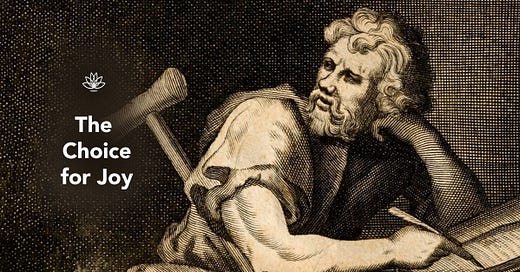The Stoic philosopher Epictetus, born in the first century AD, made a profound mark on the understanding of happiness. His teachings delve into the essence of human existence, freedom, and personal fulfillment. Unlike many philosophers of his time, Epictetus focused not on the grandiose questions of metaphysics but on the practical art of living a peaceful life.
This quote succinctly describes a core tenet of his expositions: “Everything that affects us for good or ill depends on our own judgements.” In other words, it is not outside events that affect us, only the meaning we give them.
This is a very challenging concept to rationally accept. All our senses, everything we’ve been taught, leads us to believe that joy, sorrow, and everything in between are the result of what transpires in life.
Each of us has a list, whether written or internalized, describing the conditions for happiness. Likely involving the well-being of others we care about, our own body, and resources and requisite accoutrements for satisfied sustenance.
A myth to which Epictetus, A Course in Miracles, and many other philosophies patently shatter.
It is your thoughts alone that cause you pain. Nothing external to your mind can hurt or injure you in anyway. There is no cause beyond yourself that can reach down and bring oppression. No one but yourself affects you. There is nothing in the world that has the power to make you ill or sad, or weak or frail. (W-pI.190.5)
Which leads the course to counsel accordingly: “It is with your thoughts, then, that we must work, if your perception of the world is to be changed.” (W-pI.23.1)
This liberating framework shifts the onus of responsibility off worldly affairs and into the realm of mind (not brain), the source of all thought.
You have but two [states of mind], love and fear. One you made and one was given you. Each is a way of seeing, and different worlds arise from their different sights. (T-13.V.5; T-13.V.1)
Each moment we are making a choice in the mind for one of those two thought systems. This is the judgment of which Epictetus spoke. All affliction is the result of choosing the mind of fear, peace the result of the other.
The world we experience is completely up to us. Everything that affects us for good or ill depends on which mind we’ve chosen. Let us learn to choose wisely.
Join me in Thursday’s class where we’ll explore the mind’s choice for love or fear, peace or pain, and the path to experiencing true happiness. I look forward to seeing you then.




